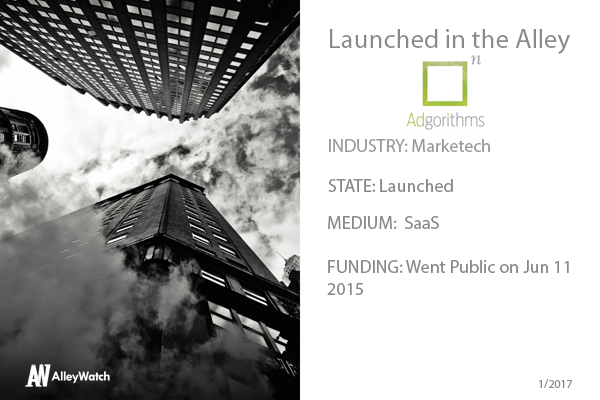AI may be eating software but some are reluctant to trust fully automated AI solutions. However in this age of endless data, this will soon change since the only realistic solution is to offload some of manual tasks using the with the use of AI. Once you see what this solution is doing, all reticence will subside. Developed by Adgorithms, Albert a complete end-to-end marketing force driven by AI. The fully autonomous intelligence platform work continuously to analyze data, synthesize key insights, and execute marketing campaigns while you sit back and allow your brand to flourish. The company is at the cutting edge of AI and helping companies across the world with its truly smart solution. It’s time to supercharge your marketing team with AI and Albert.
AlleyWatch spoke with founder Or Shani about the business and the future of marketing tech.
Tell us about the product or service.
Albert is the only artificial intelligence marketing platform that runs fully autonomous digital marketing campaigns for brands and retailers, from start to finish.
Albert serves as a highly intelligent and sophisticated member of a business’s marketing and sales team, wading through mass amounts of data, converting data into insights, and autonomously acting on the resulting insights, across channels, devices and formats, in real time—all without ongoing input from the marketer.
Created by Adgorithms in 2010, Albert’s mission is to liberate businesses from the complexities of digital marketing—not just by replicating their existing efforts, but by executing them at a pace and scale not possible by humans.
Albert is currently working with some of the worlds top and retailers. In October 2016, Harley-Davidson announced that it credits 40% of its New York City sales to Albert. Two months later, iconic global jeans designer EVISU revealed that Albert increased its digital sales ROI by 500% through its year-long, automated digital efforts in the U.S., UK, Canada Australia and Singapore.
How is it different?
There are currently a handful of AI-driven marketing and business automation platforms out there, all of which address only a narrow problem set, such as generating recommendations to customers, ad buying, email marketing or audience targeting.
Albert is the only platform that handles every aspect of multi-channel digital campaigns from start to finish, across both paid and nonpaid channels. Working with campaign creative and KPIs provided by the brand, Albert autonomously learns as he goes, identifying new audiences that brands often don’t even know they have, determining who’s most and least likely to convert, applying insights gained from one channel to others, and engaging in over 25 other core digital marketing activities.
Albert’s ability to process over a million data points per minute, act on them in real time, and work around the clock results in a drastic increase in sales and accelerated paths to revenue for the brands he works with, all the while reducing their operational costs.

What market are you attacking and how big is it?
We are working directly with direct-to-consumer brands. Our current focus is primarily in the retail, financial services, CPG, Consumer Tech, Travel & Hospitality and Pharma/Healthcare sectors. Our clients are primarily large, enterprise brands, as well as mid-sized organizations/franchises.
What is the business model?
We have a B2B SaaS model. Clients pay a percentage of the media fee to use the platform. The platform is completely holistic because Albert must do everything on-the-fly, simultaneously and take decisions as he goes, so clients get everything – there are no modules.
What inspired the business?
I spent a decade working in online advertising, primarily as a data scientist and ultimately as a VP, Marketing for companies like Supersonic Ads, Online 365 Ltd, and Playtech Group.
The vision for Albert came around 2010, in response to several widely-accepted inefficiencies I was seeing in digital marketing. For years, I kept thinking, “Why is digital so manual?” “Why are humans handling data tasks?” “Why isn’t technology dealing with technology?”
I found it absurd that top brands’ digital teams were manually gathering and analyzing data, and then “optimizing” their digital campaigns based on the insights they generated themselves. The idea of assigning “experts” to each individual advertising channel also limited brands by introducing silos where there needed to be bridges. Treating each channel as a stand-alone effort isolates insights to the channel that produced them—meaning that the channel that produced the insights was the only one to benefit from them, rather than letting insights gained from one channel inform actions on all others.
All of this needed to work together—on a far greater scale and at an exponentially faster pace—than what is possible even with the largest, most savvy digital teams. The culmination of these observations and hypotheses is what inspired me to build Albert, an AI that could work with massive amounts of data, and analyze and act on them at a previously impossible rate and scale.
Tell us about the future of marktech and AI 2017?
We see 5 key trends for martech and AI this year.
AI startups will fuel enterprise adoption (across industries): It might seem as though enterprise AI players would be most qualified to provide enterprise solutions, but AI’s move into the day-to-day will very likely be fueled by the startups who are stepping up to solve legacy problems that larger incumbents have not yet addressed. These startups typically focus on finite problem sets—working on one idea at time—while larger companies are more likely to build technology first and figure out how to apply it to their existing solutions second.
AI will get big data sorted once and for all: Big data has become a big hassle to companies and organizations that are gathering and analyzing it manually or with piecemeal technologies. Artificial intelligence’s ability to gather and analyze massive amounts of data in a very short period of time, deliver insights and recommendations based on what it learns, and then act on them without relying on a human to intervene or guide it, will become a gamechanger to businesses that begin using it.
We’ll see the emergence of “AI supervisors”: These are professionals who will be tasked with assisting the learning process involved in transitioning from manual to automated process. As AI communicates new insights to these supervisors, they’ll respond by introducing new rules, business logic, and feedback that will make the AI more useful over time. The end result will be a shift from humans doing tasks by themselves to overseeing that AI software that completes tasks on their behalf.
There will be a rise in holistic marketing technologies: As mentioned previously, there are a number of single-touch technologies on the market—those that focus on a single specific action or task. In the coming years, we’ll see more artificial intelligence platforms that can execute holistic, multi-step marketing and business processes.
We’ll have a greater ability to measure the overall effect of complex business processes: As AI steps in to convert multi-step business processes into single holistic processes—specifically in sales and marketing—we’ll see new opportunities for holistic program measurement, as well. There has been increased interest in this area in recent years, but the reality is that most sales and marketing departments are still working in a silo’d fashion, where dedicated teams are assigned different pieces of the budgets or goals, and executing independently of one another. This has meant different analytics tools at each step of a larger process, which makes no sense for gaining insight into multi-channel processes.
What are the milestones that you plan to achieve within six months?
To continue to build out the capabilities of Albert, as well as grow the business, particularly in the United States.
What is the one piece of startup advice that you never got?
Well I eventually received it, but it came a little later – it was advice from a billionaire. I was trying to hire him as a consultant, and he said to me, “You don’t need consultants; you are smart enough and have everything you need within you to find the answers and make the right decisions.”
Why did you launch in New York?
We founded the company in Israel almost 7 years ago, and all the R&D is still there. But over a year ago we decided to come to the US as we saw an opportunity to disrupt, collapse and simplify a very complex ecosystem, empowering businesses to reduce their dependency on marekting and ad agencies for execution, and to own their own data outright.
Because our system is so simple and easy to use, it solves marketers’ biggest digital marketing problems, while enabling them to deliver better results and get out of the weeds of crunching big data, tech stack building, machine operation and campaign execution. This solves massive problem for U.S. businesses and brands.
What’s your favorite restaurant in the city?
We love Buddakan!





